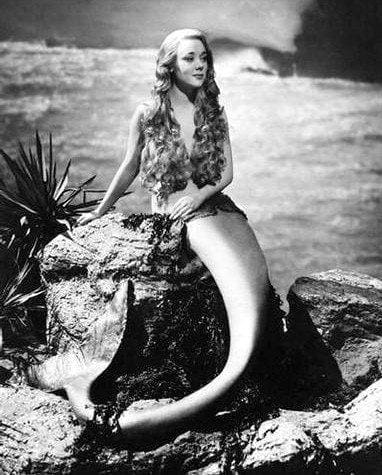One of the brightest faces – and most distinctive voices ‒ of 1940s-50s British cinema, Glynis Johns enchanted British audiences with her flirtatious, wide-eyed charm and uniquely melodic, purring tones.

An accomplished dancer, pianist and singer as well as actress, she was the daughter of the popular Welsh actor, Mervyn Johns, and her voice instantly signposts its Welsh origins. However, Glynis was actually born in Pretoria, South Africa, in 1923, where her father and mother, pianist Alys Maude Steele-Payne, were touring. Displaying a natural, not to say precocious early talent, she was appearing on the London stage by the mid-Thirties, was a leading ballerina at 12, and a hit as Peter Pan at 19. She burst into films with a scene-stealing supporting role in South Riding (1938).
Later in life, she looked back at her parents’ influence on her early choices with mixed memories: “They were situations that were hard for parents to turn down. It’s difficult to turn down a chance to star with Laurence Olivier, to say, ‘No, she has to go to school’. They had a big decision to make… as a youngster, I was interested in everything. I wanted to be a scientist. I would’ve loved to go on and on at university. But you can’t do everything in life.”
Enjoy more Best of British Magazine reading every month.
Click here to subscribe & save.
Despite her early successes, she found film work hard to come by for a few years, even resorting to the considerable comedown of accepting unbilled work, such as a walk-on in the Korda classic Thief of Bagdad (1940). She went so far as to attend a night school to learn shorthand and typing, but after her first day on the course was offered an appearance in Michael Powell’s 49th Parallel (1941) when the actress originally cast dropped out. The film was a success and her career was back on course.
One of the most striking of her early film roles was in the 1944 Ealing film, Halfway House, in which she plays the daughter of her real-life father, Mervyn Johns. The film begins with a group of travellers, each with a personal problem that needs to be resolved, arriving at a remote country inn in Wales, run by Glynis and her father. One is a black marketeer profiting from the war, another, travelling with his young daughter, plans to divorce his wife, while another couple have recently lost their son and their relationship is crumbling under the weight of the loss. Slowly, the guests become aware of a strange atmosphere in the house, and begin to notice inexplicable things, such as the fact that all the newspapers are a year old, as are the broadcasts on the radio. Thanks largely to the intervention of the landlord and his daughter, the visitors solve their problems during the course of their stay, and set off to face a brighter future than they had envisaged for themselves before they arrived. Only then do they learn that the inn had been destroyed by a Nazi bomb exactly one year earlier, and Glynis and her father had been killed.
The best of her early film roles were those that exploited the potential of her unusual looks and style in these kinds of otherworldly roles. The supreme example is surely her bewitching turn in Miranda (1948). Backed by a first-class supporting cast, including Googie Withers, David Tomlinson and, best of all, Margaret Rutherford as Miranda’s devoted nurse, Glynis plays a mischievous Cornish mermaid causing confusion and consternation in London, after a vacationing society doctor on a fishing trip visits her cave and decides to show her the sights of a big city.
The film is full of delightful episodes, including the famous moment in which she catches a fish in her mouth during feeding time at the zoo. Fitted with a convincing rubber tail especially designed for the film by Dunlop, Johns is in her element in the film, which proved successful enough to prompt a Technicolor sequel, Mad About Men (1954), for which both she and Rutherford returned. “I was quite an athlete; my muscles were strong from dancing, so the tail was just fine,” Glynis later recalled. “I swam like a porpoise.”
An appearance the following year opposite Dirk Bogarde in the film Dear Mr Prohack had a most unusual consequence for her: her first husband, Anthony Forwood, left her to become Bogarde’s manager and long-term companion. Glynis would go on to marry another three times, meeting her second husband, WWII hero and chairman of Colgate Palmolive, David Foster, while appearing on Broadway in 1952.
For a while she attempted to maintain her British and American careers simultaneously, and though she once said, “I would sooner play in a good British picture than in the majority of American pictures I have seen,” by the mid-Fifties, she had relocated fully to the States. She tried television (her own starring sitcom Glynis proved short-lived in 1963) and in films scored a success alongside Danny Kaye and Angela Lansbury in the delightful comedy The Court Jester (1954). She went on to win an Oscar nomination for The Sundowners (1960), and in 1965 played perhaps her most famous role of all, the suffragette Mrs Banks in Mary Poppins.
But her greatest successes in America were to be found on the stage. In Stephen Sondheim’s A Little Night Music (1972) she originated the role of Desiree, whose famous song Send In The Clowns, was specially written during rehearsals to suit her voice and delivery. Though Glynis fell ill during the previews of the show and was expected to pull out of its New York run, she forced herself to continue, going on to win a Tony Award as Best Lead Actress in a Musical. As late as 1991, she was still appearing on Broadway in a revival of the show, this time playing Desiree’s mother.
She was also still appearing in films, including the Sandra Bullock comedy While You Were Sleeping (1995). As she said around this time: “In classical theatre in Europe, everybody plays all kinds of parts. Juliets go on to play the nurses; they don’t want to play Juliet again. I think we’ve got to remember to grab onto our perks, whatever is the good thing about each age. Each stage of life should be a progression.”
Living testament to the validity of that creed, Glynis will be 87 this year, and remains one of the most fondly remembered, charming and distinctive of all British film star favourites.
Matthew Coniam
This article appeared in the May 2010 issue of Best of British.

